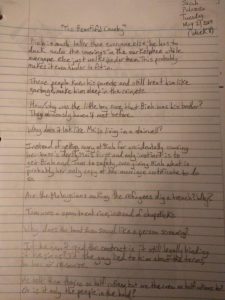TagWeek 8
- Introduction
- Brief history of superheroes
- Modern superheroes and superhero culture, Marvel vs. DC, etc.
- Brief history of superheroes
Superheroes have become an increasingly popular part of mainstream culture in recent years, a phenomenon helped along by the nearly constant stream of superhero movies that began in the 2000s. From the X-Men movies with Patrick Stewart as Professor Charles Xavier and Hugh Jackman as Wolverine, to Tobey Maguire as Peter Parker in the Spider-Man trilogy, these movies did a lot to help popularize superhero movies as a part of mainstream culture. There had been other superhero movies before this, of course, such as with the various Batman movies over the years, but they were more spread out. Flops such as Batman and Robin became laughingstocks, as it was considered too campy and not nearly realistic enough to satisfy an audience that had come to expect grit and darkness from Batman, a far cry from the days of Adam West’s rendition of the “Caped Crusader”. DC’s superhero movies have improved in quality and diversity over the years, expanding from Batman and the Green Lantern to other heroes such as Wonder Woman and Aquaman, whose titular characters were both played by people of color. But Marvel has outpaced DC in sheer popularity, with their steady stream of box office hits infusing the public consciousness with a superhero frenzy. The Marvel Cinematic Universe, or MCU as it’s known by fans, began in 2008 with the first Iron Man movie, and continues in the present day with Avengers: Endgame which was released earlier this year. With the charismatic Robert Downey Jr. as Tony Stark, Iron Man sparked a wave of superhero movies the likes of which had never been seen before. The MCU was probably the most ambitious movie series that had been attempted before as each movie was part of a single cohesive universe, so the writers had to make sure that each movie built on the previous ones. This kind of worldbuilding had been previously confined to mediums such as comic books, which as the source material for the MCU helped make it feel as though the movies were depicting the fans’ favorite comic book heroes come to life. This is part of what made the MCU’s popularity soar.
I thought this article was interesting, and it brings up what I think is an important topic right in the first few sentences; media often focuses very heavily on white relations with minorities rather than minorities with each other. I was thinking about it as I read the article, and it made me a little angry, because the more I think about it, the more it feels like white people tend to think of things in terms of white vs other, which not only dehumanizes other races, but makes them feel interchangeable. There’s no point in defining interracial relationships as anything other than Asian and white, or black and white, or “Mexican” (Latinx) and white, because they’re all minorities and therefore all interchangeable, right? It’s like when they call all Asians with the C-slur because they assume they’re all Chinese, or don’t care whether or not they’re actually Chinese because they don’t consider them human anyway.
Also, the end of this article is hopeful and positive, and serves to remind readers that relationships should be about love, not about what race you are. I feel like many people don’t understand or care about whether there’s actually love involved, and I think that tends to hurt society as a whole.
Miss Lien:
- “The oldest of seven children, Lien was hardly ever alone.” (pg 4) Since it was already established that she was having a baby, obviously she did manage to be alone at some point. Was it because of someone taking advantage of her or because she was a “little slut” as the people on page 3 so rudely put it?
- “But Lien knew it wasn’t her mother’s age that worried them.” (pg 7) My first thought was that she had cheated on Lien’s father or something, and that was why they reacted strangely to the pregnancy. It wasn’t until they started talking about a war that I realized they were probably worried about safety.
- “The midwife spread her lips, revealing black-lacquered teeth. Lien realized she must have come from a family of wealth.” (pg 8) What is put on the teeth to make them black, and what makes that a sign of wealth? How did a custom like that come about?
- “I wasn’t sure about looking at my first either, knowing I had to give it up.” (pg 12) Are these girls being purposefully impregnated by men – possibly American soldiers? Or are they doing this themselves because they’re desperate and they don’t have any other ways to make money? Or is this place some sort of shelter for pregnant girls? I’m confused.
© 2025 Sarah's A-POP Blog
Theme by Anders Norén — Up ↑
